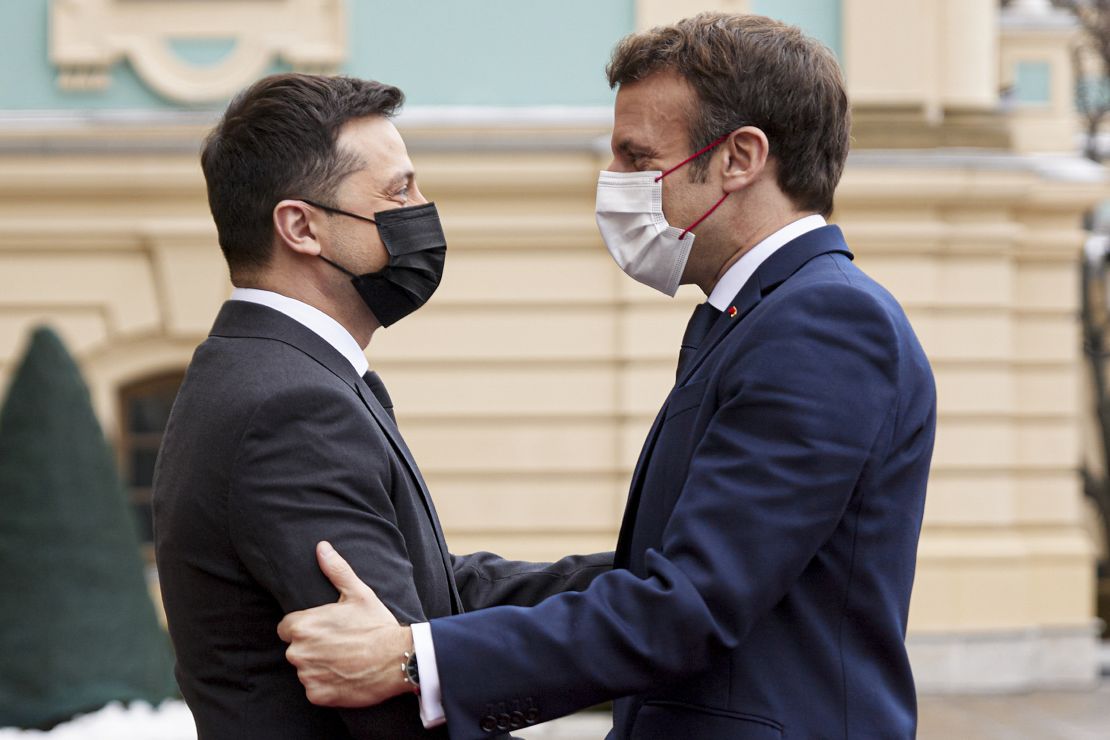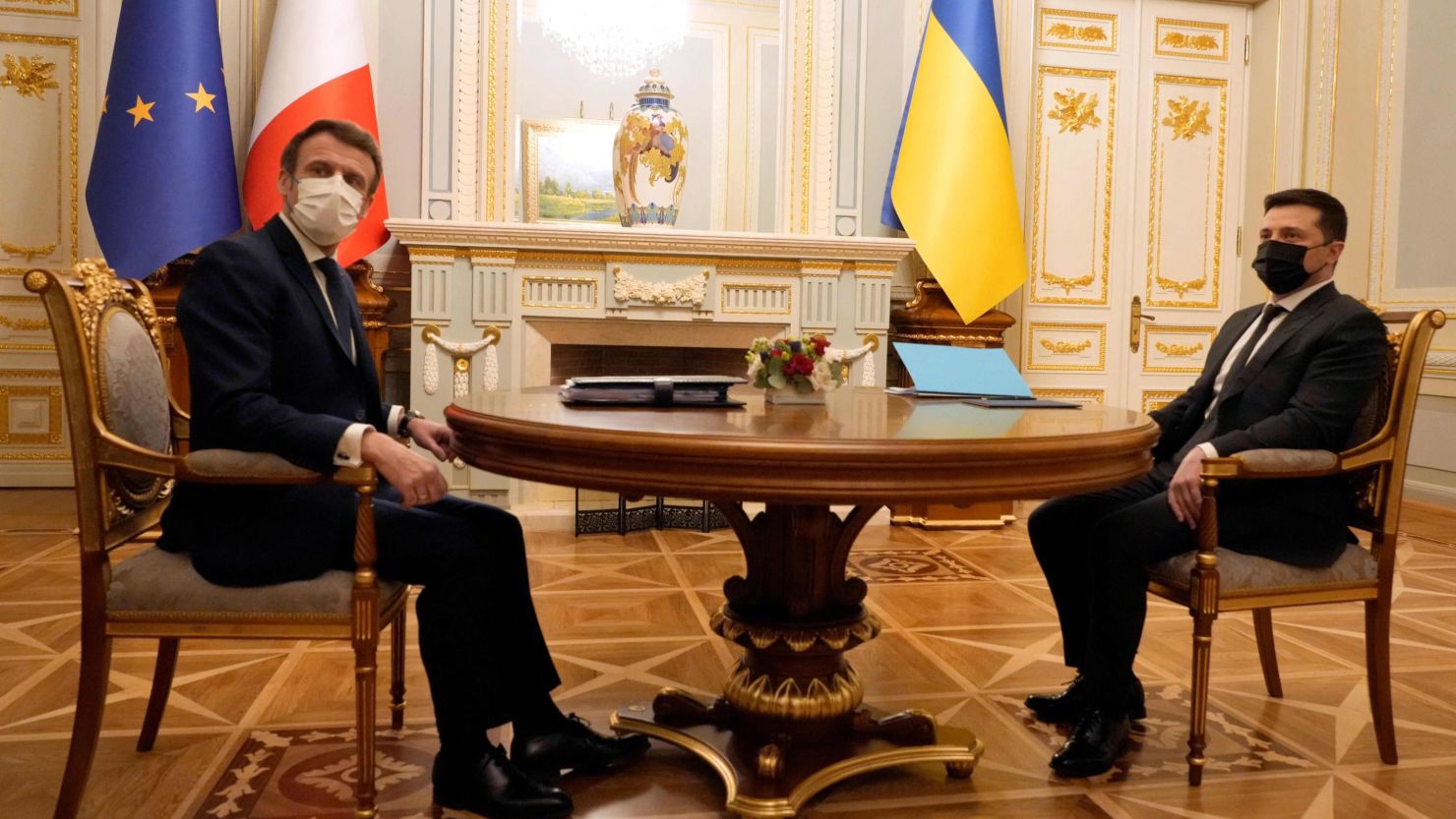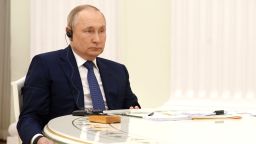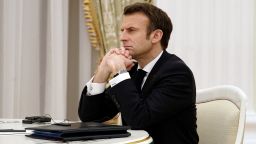As French President Emmanuel Macron visited his Ukrainian counterpart Volodymyr Zelensky in Kyiv on Tuesday for diplomatic talks on the country’s crisis with Russia, Moscow indicated there were “points of convergence” laid out by Macron during his five-hour meeting with Russian President Vladimir Putin a day earlier.
But the Kremlin has poured cold water on reports that the two leaders had agreed to de-escalate the tense standoff on Ukraine’s border, where tens of thousands of Russian forces have massed in recent months, drawing warnings from Western officials of an impending invasion.
The Kremlin’s spokesman Dmitry Peskov on Tuesday would not confirm any tangible steps toward a resolution, casting a cloud over the French president’s shuttle diplomacy as he addressed the media in a joint press conference alongside Zelensky.
Macron told journalists in Kyiv that his trip to Moscow had delivered concrete solutions for stability on the European continent and that Putin said he “would not be the cause of an escalation.” He added that the Russian president had promised to respect the Minsk agreements, a ceasefire protocol signed by Ukraine and Russia in 2015 after Russia annexed Crimea and fomented a rebellion in Ukraine’s east. Despite the agreement, the two sides have not seen a stable peace.
Putin on Monday insisted in no uncertain terms that Zelensky must implement the peace plan in a press conference with Macron on Monday. “Like it or don’t like it, it’s your duty, my beauty,” Putin said of Zelensky.
Zelensky recently stated that he does not like a single point of the Minsk agreements, which requires Ukraine to give autonomy to two Russian-backed separatist regions in the country’s east. To critics, the accord could give Moscow sway over Ukrainian politics.
Responding to a question about Putin’s stark, undiplomatic language, Zelensky responded in Russian, saying bluntly: “We are not his.”

As Putin tests the West’s resolve, Macron has thrust himself to center stage, taking former German Chancellor Angela Merkel’s place as leading mediator for Europe as he readies himself for a re-election bid at home. Currently at the helm of the European Union’s rotating presidency, Macron has spoken several times per week with Putin, and placed his third phone call in a week to Biden on Sunday evening.
The Elysee Palace trumpeted a list of key takeaways from Macron’s meeting with Putin, including Russia’s “commitment not to take new military initiatives, which allows for de-escalation” and that Moscow would withdraw troops from Belarus.
But when asked about the statement from the French presidency, Peskov said he did not know anything about it: “I can’t comment on it, I do not quite understand what French colleagues were talking about.”
And though Putin’s spokesman did confirm that Russian military forces will leave Belarus once joint exercises between the two countries conclude, he did not give further specifics or a sense of the timeline for withdrawal. Ukrainian intelligence officials fear Russia could use Belarus as a “full-fledged theater of operations,” having ramped up its military presence from several thousand troops in January to an estimated 30,000 sometime this month.
“We are talking about allied exercises, and it is understood that upon completion of these exercises, the troops will return to their permanent bases,” Peskov said in a conference call with reporters. Asked if a concrete date had been given by Putin, Peskov said, “No.”
Based on the latest US intelligence estimates, Putin has assembled 70% of the military personnel and weapons it would need for a full-scale invasion of Ukraine, but US officials say they still don’t know whether Russia’s leader has decided to launch an attack. The Kremlin has repeatedly denied it is planning an incursion, but has argued that NATO support for the country constitutes a growing threat to Russia.
Speaking at the joint press conference, Zelensky said: “We stand for the de-occupation of our territory.” He added that the talks with Macron were “fruitful.”
Ongoing diplomacy
As Russia deploys more troops onto Ukraine’s border and the US moves thousands of forces to bolster NATO’s eastern front, the Kremlin’s noncommittal comments on Tuesday have put a damper on another busy diplomatic day for Macron.
The French President also met with German Chancellor Olaf Scholz and Polish President Andrzej Duda on Tuesday in Berlin.
Macron, who in 2019 said bluntly that Europe was facing the “brain death of NATO,” caused by American indifference to the transatlantic alliance, and has called on the EU to take on a larger role in Europe’s defense, is now getting a chance to lay out his vision for what a Europe more independent from US influence might look like.
Speaking alongside Scholz and Duda, Macron told reporters that diplomatic efforts in the last few days have “allowed the emergence of new leads” to de-escalate the tensions between Russia and Ukraine.
He said the first objective of the ongoing diplomatic efforts is to “avoid war.”
The second objective, Macron said, is to “defend Europe and its allies” with the third being the defense of “principles that have made Europe in the past 30 years, in particular the respect of the sovereignty of all states, the territorial integrity, and values.”
Macron also reiterated the importance of dialogue with Russia to avoid any escalation and to “build stability and peace on the long run.”
To Moscow, Macron has presented himself as a “quality interlocutor,” as Putin described him, according to an official in the French presidency.
The stakes could not be higher. Macron is seeking to stop the massive Russian military buildup of more than 100,000 soldiers from bubbling over into war and soothe Russia’s security grievances.
“No one is naive,” Macron told reporters Tuesday. “France, since the beginning of this crisis, has never made excessive statements on the subject, but in the same way I do not believe that this crisis can be resolved by a few hours of discussion.”
CNN’s Stephanie Halasz, Pierre Bairin and Anna Chernova contributed to this report.




